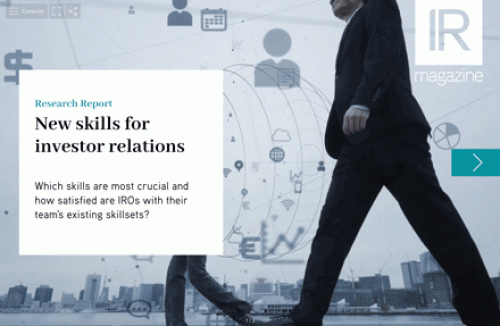Back as a consultant after 17 years as an in-house IRO, Deb Wasser, executive vice president at Edelman Financial Communications & Special Situations, reviews how IR has changed

The DeLorean DMC-12, famous for its appearances in the Back to the Future film trilogy
When friends and colleagues ask why I decided to make the big (and unusual) leap from IRO to IR consultant, I answer quite clearly: I wanted to go back to ‘the future’ of IR – to take on new challenges, expand my horizons beyond the technology industry, and up my IR and strategic communications game.
Until January 2015 when I joined Edelman, I was head of IR and corporate communications at Veeco Instruments for 17 years. Veeco is a small capitalization technology stock with a big capitalization IR program. It was a rollercoaster of ups and downs in a highly cyclical sector, the peak of the cycle being very rewarding, while the troughs brought many challenges as well as excellent opportunities to enhance our reputation. With more than 20 sell-side analysts, a global shareholder base, an accounting crisis, one CEO and two CFO transitions, more than a dozen acquisitions and several equity and debt offerings, investor relations was always in the mix and held a prominent role at the table.
While I started my career with cross-border IR communications consultancy firm Dewe Rogerson, it has been quite a while since I was last an IR consultant. When I left Dewe Rogerson in 1997 to join Veeco, my hair was certainly bigger and curlier, I had a closet full of brightly colored pantsuits and a few less lines of distinction on my face. My daughters, one now a junior in college and the other about to leave the nest, were just babies.
Past developments
But that’s not all that has changed in 17 years. Flashback to the late 1990s: the rapid rise of the internet was fueling a bubble that would soon burst; a roaring stock market provided capital for a wave of global merger mania, until the Asian financial crisis hit; the euro was a new currency concept and experts were unsure how it would affect global business; and the Titanic was crashing into icebergs at a theatre near you.
Having spent my entire professional career in IR, it is interesting to take a look at how far we, as a collective of IR professionals, have come. What has changed? What has remained the same?
Between 1997 and 2015 we have seen:
• The internet and new platforms for disclosure transforming our practice from pre-Reg FD days to today’s world of releasing news via tweets
• The early days of webcasting, when no one was sure what we could say or who was even listening, now featuring highly orchestrated earnings calls with live web-decks and dynamic Q&A sessions – some even prerecording prepared comments
• The evolution from printed annual reports being the norm to many more varied ways to tell your corporate story on the web, in video, with infographics and via social media
• Third-party perception audits changing from a few thoughtful phone calls to elaborate projects using multiple outreach methods, deep qualitative and quantitative methodology and sophisticated, actionable insight
• Investor days moving from simple luncheons at a hotel to elaborate multi-media events with months of preparation and heightened expectations (for both company and attendees)
• Investor marketing developing from a bit of a scattershot approach to highly sophisticated outreach, supported by limitless shareholder intelligence, trading data and corporate access teams clamoring for executives’ time
• The movement of IR from an often segregated role to being viewed as a strategic C-suite function, integral to a corporation’s strategic messaging in the age of rapidly changing social media and evolving influencers
• The very profound change in governance issues from a time when top issues were rather mundane – poison pills and classified boards – to today’s ever-changing world of heightened shareholder engagement in the boardroom.
Present values
While so much has changed, much also remains the same. An IRO’s job is still about advising management on how to communicate about the future value of the company for shareholders today, rather than reporting on its past. As an IRO, your credibility is your currency and knowledge of your company is your power – both internally and externally. I have always believed IR is the best job you can have in a company. IROs get to appreciate its warts and its beauty, from the inside out AND the outside in. We have the ability to partner with the C-suite to influence its narrative and its future.
I often sought out consultants during my years at Veeco, and always found their third-party advice and broad experience highly valuable. In these early days, I find myself to be completely energized by the move. With my Edelman team, we have worked on multiple cross-border M&A transactions, several of the year's biggest spin-offs and IPOs, investor days and perception audits, and multiple activist campaigns. We don’t hang around a water cooler; we gather around the wall-mounted TV in our open space office in SoHo watching our many clients that we have prepped for their moment in the spotlight. The atmosphere is electric, and I am loving it.
I know that as a consultant again, I’ll never know my client companies as well as IROs do, or as well as I knew Veeco. But I know my service as a sounding board for ideas will help the Edelman team and our clients think differently, provide a second opinion when times get tough, or add some communications muscle on a major transaction, so I’m busy revving up my DeLorean for some fun times ahead.
When to call in a consultant
• When you need objective third-party insight into what is being said about your company.
• When an activist investor calls, consultants have ‘been there, done that’ and can serve as a valuable intersection between bankers, attorneys, your management and your board thinking through your equity story, your governance position and how to activate media.
• In a crisis or when your company is going through a significant change, such as a financial materiality issue or an executive transition.
• When you want to amplify your company’s financial narrative or boost media exposure of your story.
• When you know exactly what needs to be done, yet need some extra firepower to support your position or help execute your idea.
• When you want to conduct an audit to potentially improve your IR program with insights into what is new or best practice in your space.
• When you are planning a spin-off or IPO.
• When you need some extra support – strategic or tactical – for an analyst day or special event.
• When your company is the subject of media speculation on a potential (or actual) merger, acquisition or other transaction.
Deb Wasser is executive vice president at Edelman Financial Communications & Special Situations.










